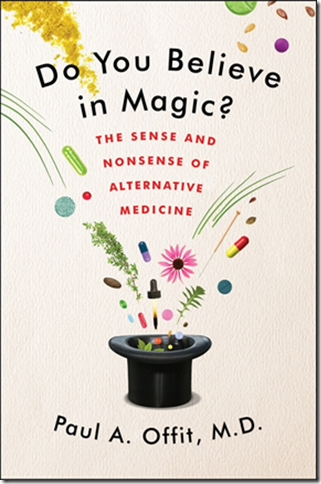 In 1977, Joey Hofbauer, age 7, was diagnosed with Hodgkin’s disease, a cancer of the lymph nodes. Doctors said that chemotherapy and radiation would give the boy an excellent chance of survival.
In 1977, Joey Hofbauer, age 7, was diagnosed with Hodgkin’s disease, a cancer of the lymph nodes. Doctors said that chemotherapy and radiation would give the boy an excellent chance of survival.
But the parents decided, instead, to treat their son with laetrile, an unproven natural remedy made from apricot pits. Three years later Joey was dead. In 1987 the Food and Drug Administration banned the use of laetrile.
Paul A. Offit, who heads the infectious diseases unit at the Children’s Hospital of Philadelphia, recounts that story in his important new book, Do You Believe in Magic?, a withering critique of so-called alternative medicine.
Half of Americans use some form of alternative medicine, which has become a $34 billion-a-year business.
Alternative medicine promises certainty, compared with the fluidity of modern medicine, which is continually subject to new discoveries about the causes and prevention of various illnesses.
The ancients believed that God or gods caused disease. Shamans, witches and priests prescribed prayer, amulets and sacrifices. The practice of bloodletting was a popular treatment well into the 18th century. Among its victims was George Washington, who died when a doctor drained half the blood from Washington’s body to treat an inflammation.
Despite advances such as the use of vaccines and penicillin, many people remain skeptical about mainstream medicine and are easily seduced by hucksters who peddle worthless remedies.
The renowned scientist Linus Pauling, “arguably the world’s greatest quack” in Offit’s opinion, claimed that massive doses of vitamin C and other supplements could treat the common cold, as well as dozens of other illnesses, ranging from cancer to heart disease, glaucoma and kidney failure. Researchers now say that huge doses of vitamins and supplements actually increase the risk of heart disease and cancer.
Congress became involved in the controversy in 1974 when it banned the FDA from regulating megavitamins.
Alternative medicine is somewhat of a misnomer, Offit says. The real distinction should be between medicines that work and those that do not work.
Although some alternative treatments or practices are harmless, others are dangerous. Offit cites the unproven belief that vaccines cause autism. Because some parents refuse to have their children vaccinated, serious cases of whooping cough, measles, mumps and other preventable illnesses have increased.
In the 1800s medicine men sold worthless elixirs that promised to cure cancer. The phony concoctions variously contained talcum, alcohol, cocaine, sand and clay, among other ingredients.
Many current alternative medicine promoters, such as Deepak Chopra, Andrew Weil and Mehmet Oz, gained fame by appearing on the Oprah Winfrey Show, where they basked in her enthusiastic admiration.
Some alternative therapies appear to work because of the so-called placebo effect. No one knows exactly how or why it works, but the results can be dramatic.
Offit cites the ancient practice of acupuncture, in which needles are inserted under the skin on the theory that diseases are caused by an imbalance of energies. Researchers have divided patients into three groups and then compared the results when needles are inserted into correct or incorrect acupuncture points and when needles merely touch the skin, but are not inserted. Patient satisfaction is the same in each case. Numerous studies have demonstrated that what patients believe affects the outcome, which shows the power of the mind-body connection.
Do You Believe in Magic? is a solid piece of reporting, but the book is stuffed with so many stories, facts and statistics that readers sometimes may be more confused than convinced.
The author catalogues horror stories involving worthless gadgets and concoctions that make their promoters wealthy, but do nothing to help desperate patients. He cites the sale of Rife machines, which among other things promise to electrocute the bacteria that cause Lyme disease.
Offit concludes that “alternative medicine becomes quackery” when practitioners steer people away from conventional therapies that work and promote potentially harmful therapies without adequate warnings.
Consumers should not give alternatives “a free pass” because they are fed up with conventional medicine, Offit says. All therapies ought to be subjected to the same rigorous testing to see which ones actually help.
The book will have served a useful purpose if it persuades readers to be skeptical about some of the outlandish claims of alternative medicine.
Do You Believe in Magic? The Sense and Nonsense of Alternative Medicine, by Paul A. Offit; Harper, 322 pp.; $26.99
Bill Williams is a free-lance writer in West Hartford, Conn., and a former editorial writer for The Hartford Courant. He is a member of the National Book Critics Circle and can be reached at billwaw@comcast.net.